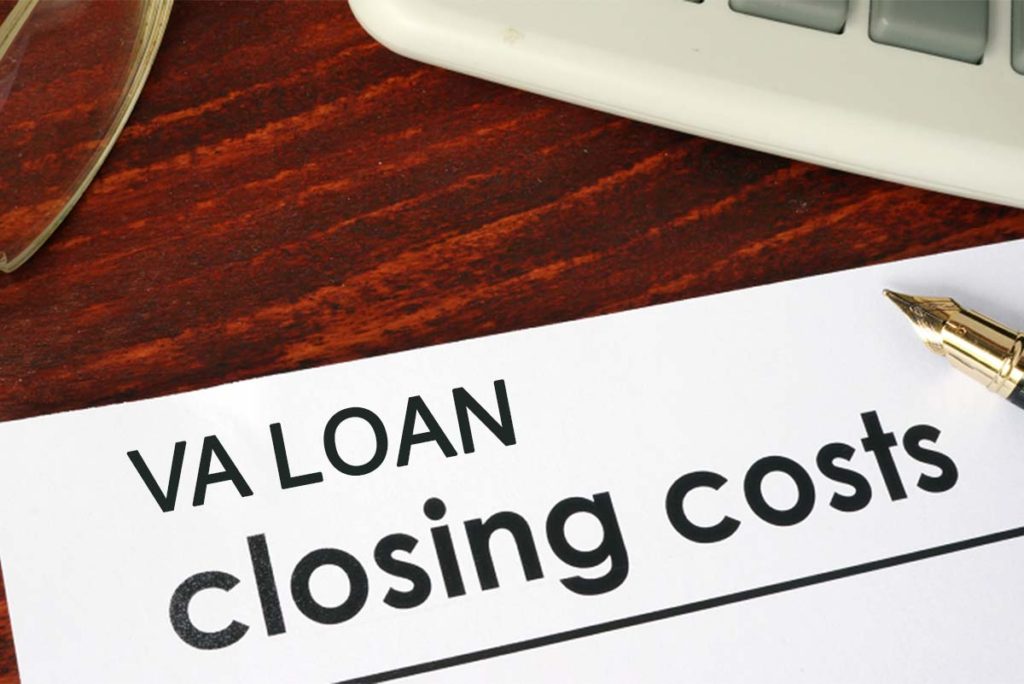VA Loan Closing Costs. Coming up with a down payment for a new home is often the thing that keeps people from taking the leap from renter to homeowner in the first place. That’s why US veterans, active-duty service members, National Guard, and reservists who may not have saved up enough for a down payment look to VA (Veteran Affairs) loans to help make homeownership a reality.

VA loans allow for 100% financing of a property, meaning no down payment is required for eligible applicants. And because a VA loan comes with a 25% lender guarantee, PMI (private mortgage insurance) is not required either. All of this saves you money over the life of your mortgage, but there are some out-of-pocket expenses that come with a VA loan, including typical mortgage closing costs and a VA funding fee.
VA Funding Fees
Many homeowners who have purchased a home through the VA program — backed by the US Department of Veterans Affairs because the benefits of the VA loan program far outweigh the applicable (and unavoidable) funding fees that come with it.
For instance, if you’re looking to buy a $200,000 house and you’re eligible to buy that home with a VA loan. VA loans require no down payment from the borrower, however, if you’re a first-time user of the VA-backed loan program and you are going the route of putting no money down, you will be charged a funding fee of 2.3% of the total loan amount, or $4,600. If you’re able to make a down payment of $10,000 (5% of the $200,000 loan), you would pay a VA funding fee of 1.65% of the $190,000 you’d still need to borrow, which would equal $3,135.
Federal law requires VA loan funding fees, but, as with any rule, there are exceptions. While anyone purchasing a home through a VA loan is required to pay the funding fees, the following are exempt:
- Homebuyers who receive VA disability payments for military service-related injuries
- The Homebuyers entitled to receive compensation, but who are not presently in receipt because they on active duty Homebuyers who would receive VA disability payments if they weren’t receiving retirement pay
- Homebuyers who are serving on active duty that provide evidence of having been awarded the purple heart
- The surviving spouses of military personnel who died while in service, or of veterans who died due to service-related disabilities and who is receiving Dependency and Indemnity Compensation (DIC)
VA Loan Closing Costs
While closing costs are generally minimal with a VA loan, homebuyers may want to budget for these as well. Unlike funding fees, closing costs can not be rolled into the loan amount. The following fees may apply to your VA loan application:
- Charges to pull credit reports and credit scores
- Costs to do a property title search Determination of whether the home requires flood insurance
- Taxes and assessments based on federal, state, and local laws
Additional fees the VA allows an applicant to pay: The VA (Veteran Affairs) regulates which fees VA loan applicants can be charged. These smaller expenses are often included in a lump-sum lender fee: typically about 1% of the total loan amount. Below are some of these expenses that other lenders may cover with their lender fees:
- VA loan application fees
- Document preparation fees
- Mortgage prep and/or assignment fees
- Notary public fees
- Postage
Fees the VA does not allow an applicant to pay: While some are common with conventional mortgages, the Department of Veterans Affairs does not let the following fees to be charged to a VA loan applicant:
- Lender attorney fees
- Real estate commissions
- Broker fees or compensation
- Transaction Coordinator (TC) expenses
- Termite inspection fees (in most states)
